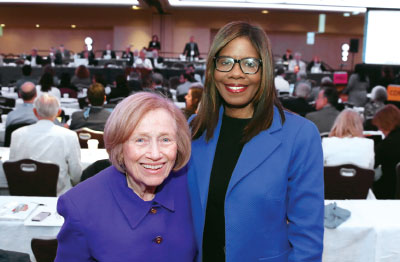AMA Chair on Opioid Abuse Addresses APA Assembly About Ways to Reduce Opioid Crisis
Abstract
The chair of AMA’s Task Force to Reduce Opioid Abuse urges a focus on access to quality treatment, not on law enforcement.
Treatment, treatment, treatment.
That’s where the emphasis needs to be in meeting the nation’s opioid epidemic—not just on reducing the number of opioid prescriptions, said Patrice Harris, M.D., a psychiatrist and chair of the AMA Task Force to Reduce Opioid Abuse. Harris addressed the APA Assembly last month at its meeting held in conjunction with APA’s 2018 Annual Meeting in New York. Harris is a candidate for president-elect of the AMA and a past chair of the AMA Board of Trustees.

Carolyn Robinowitz, M.D. (left), and Patrice Harris, M.D., are pictured at the Assembly meeting after Harris, chair of the AMA Task Force to Reduce Opioid Abuse, discussed actions that need to be taken to end the opioid epidemic and provide improved pain management. Robinowitz was recognized for her years of service as chair of the AMA’s Section Council on Psychiatry.
“The epidemic was initially driven by overprescription of opioids, but we know now that opioid overdoses and deaths are increasingly related to use of heroin and fentanyl,” Harris said. “We need to bring down the number of prescriptions for opioids, and the AMA strongly urges physicians to make use of state prescription drug monitoring programs [PDMPs].”
Harris said the increasing adoption by physicians of PDMPs is a success story, noting that participation has increased in states that do not mandate participation as well as those that do. “If PDMPs are user friendly, physicians will participate,” she said.
But while that is necessary, it isn’t sufficient.
“We are trying to broaden the conversation to get policymakers to consider a range of options, especially policies that make medication-assisted treatment (MAT) accessible and affordable.” That includes access to the three medications approved for the treatment of opioid dependence: buprenorphine, methadone, and naltrexone.
Harris outlined the AMA’s six leading recommendations to physicians and policymakers:
Make use of state PDMPs.
Enhance training of physicians in pain, use of opioids, and substance use disorders.
Support comprehensive care for people with pain and substance use disorders. Harris said that the AMA is urging all physicians to receive training to deliver MAT and training in pain management.
Continue to fight the stigma associated with substance use disorders.
Support access to naloxone.
Talk to patients about safe storage of pain medications.
“We need to keep the focus on a public health response to the opioid crisis and on access to quality treatment, not on law enforcement,” Harris said.
At the meeting, the Assembly also recognized Carolyn Robinowitz, M.D., long-time chair of the AMA Section Council on Psychiatry and a former APA president. She will step down as chair of the section council after the meeting of the AMA House of Delegates later this month. Jerry Halvorsen, M.D., of Wisconsin will succeed her.
Robinowitz, who has been active in the AMA since 1975, said the stature of psychiatry and the respect with which it is accorded throughout medicine has been extraordinary.
“It has been remarkable to be a part of that process, and it’s a real success story for psychiatry and APA,” she said. “We are all so proud of Patrice, and her leadership in the AMA is reflective of the high regard in which psychiatry is held in the House of Delegates.” ■



